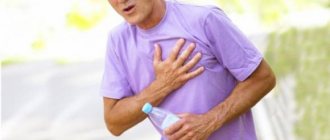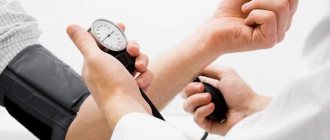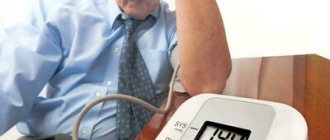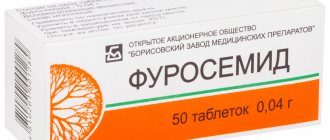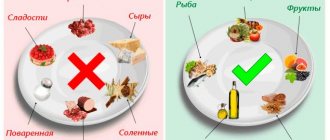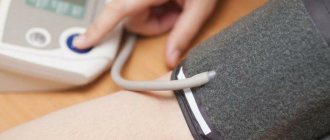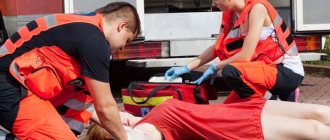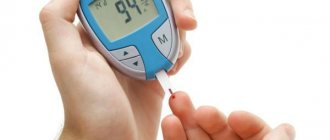A sharp jump in blood pressure is a dangerous phenomenon that can lead to irreparable consequences for the brain, heart, kidneys, fundus and blood vessels. Timely assistance during a hypertensive crisis will help stabilize the condition before the ambulance arrives, minimize the risks of complications and even save the patient’s life. It is important to know how to determine that a violation has occurred and how to relieve an attack with minimal consequences for the body of a person suffering from hypertension.
In what cases is urgent help needed during a crisis?
The concept of “hypertensive crisis” is used if the pressure has increased to levels above 140/90 mm Hg. Art. But if one person with such a pressure feels all the symptoms of a crisis, then another with a pressure of 170/100 feels comfortable. Therefore, doctors focus not only on the tonometer readings, but also on accompanying signs, which can be determined during the initial examination. Most often, a sharp rise in pressure is observed after such cases:
- severe stress;
- drinking alcohol;
- physical activity;
- changes in weather conditions;
- self-cancellation of medications for hypertensive patients prescribed by the attending physician.
The crisis is provoked by diseases of the cardiovascular system, chronic disorders in the functioning of internal organs, and tumors. For example, with pheochromocytoma, some patients experience up to 15 attacks per day.
The main sign of a crisis is rapidly rising blood pressure. However, this symptom cannot always be determined if you do not have a tonometer at hand. In this case, it is worth paying attention to other factors indicating a serious condition of the patient, namely:
- squeezing pain in the heart;
- dizziness;
- nausea turning into vomiting;
- visual impairment;
- throbbing pain in the temples;
- tremor of the upper extremities;
- feeling of chills with a sharp increase in sweating;
- tachycardia;
- facial skin hyperemia;
- nervous system excitement;
- difficulty breathing, shortness of breath;
- impaired coordination of movements;
- panic attack.
A panic attack caused by a crisis aggravates the condition, as it provokes the release of adrenaline, which further increases blood pressure
Symptoms of a hypertensive crisis vary in strength and duration depending on the type of disorder and the reasons that caused the condition. In an uncomplicated (hyperkinetic) attack caused by stress, lasting several hours and not posing a threat to life, the main symptoms are dizziness, nausea and headache.
With complicated hypertensive encephalopathy (hypokinetic type), the signs of a crisis are pronounced and require mandatory medical care.
How to stop this process at home and what is the algorithm of action? What kind of help can be provided to the patient without aggravating his condition before the doctors arrive?
No ads 1
Prevention
- Every hypertensive patient should be informed about what causes can lead to a hypertensive crisis.
- Strictly follow all necessary medications prescribed by your doctor. Negligence in taking vital medications often causes a crisis.
- Follow a diet. Excessive consumption of salty foods leads to fluid retention in the body and, consequently, increased blood pressure. Fatty, fried foods cause the formation of cholesterol plaques. The latter, in turn, clog blood vessels and contribute to increased blood pressure.
- Hypertensive patients are strictly not recommended to drink alcoholic beverages, which excite the nervous system and cause vasoconstriction.
- Take medications regularly to normalize blood pressure.
- Eliminate caffeine-containing drinks from your diet.
- Completely get rid of bad habits.
- From time to time, take a course of therapeutic massage.
- Take sedative medications regularly.
Patients suffering from hypertension are advised to regularly monitor their blood pressure, promptly replenish their own first aid kit with the necessary medications, and if the above-described symptoms occur, immediately seek medical help.
Maintaining a healthy lifestyle, giving up bad habits, proper, rational nutrition and sports are the reasons for a person’s external and internal health. Any disease can be prevented if you take timely care of your own condition. Following these simple recommendations allows hypertensive patients to keep their blood pressure under control and enjoy a full life.
What to do before the ambulance arrives?
First aid is provided in a certain sequence, the accuracy of which determines the result. And not only hypertensive patients, but also their immediate environment should know what to do when their blood pressure rises:
- the patient should take a horizontal position (head elevated) or sit comfortably in a chair with his hands on the armrests;
- any physical activity, including walking, is prohibited;
- a cold compress is applied to the head;
- Clothes that are in the way and constricting the upper body are removed or unbuttoned;
- it is important to open the window, providing a flow of fresh air into the room;
- legs, if a person feels chills, are covered with a blanket (the legs and feet can be warmed with heating pads or foot baths);
- the patient is given a hypertensive drug intended to lower blood pressure;
- Sedatives, such as motherwort or valerian, will help calm a panic attack;
- a person’s breathing should be even and deep, for this you should sit next to him, talk to him, calming him down and setting him up for positivity.
The patient's condition is constantly monitored by measuring blood pressure (if a tonometer is available) and pulse rate every 15 minutes
During the first 2 hours after an attack, blood pressure should be reduced by 20–25%. Over the next 5–6 hours it is slowly and surely brought to normal levels.
Correctly provided first aid often completely stabilizes the condition (in an uncomplicated type of crisis). But even in this case, if the situation happened for the first time, you should consult a doctor who can determine the nature of the disorder and the cause that caused it, and prescribe the optimal treatment regimen.
Preparations for home use
Every hypertensive person has medications at home that the doctor prescribed specifically for emergencies. They are the ones that should be used to stop the crisis. If an attack occurs for the first time, the best solution would be tablets or injections of Papaverine, Drotaverine or Dibazol.
Diuretics are useful for getting rid of arterial hypertension, among the most popular of which are Lasix and Furosemide.
Hypertensive patients often make the mistake of taking long-acting medications for hypertensive crisis, which they drink daily. Such products have a cumulative effect, and they are simply not able to cope with a sharp increase in pressure due to their chemical characteristics.
Stabilization of pressure is determined 30–60 minutes after taking the medicine. The average period of action of drugs aimed at eliminating the symptoms of a hypertensive crisis is 4 hours. If the pressure rises again, you should repeat the pill or give a new injection.
No ads 2
What should you not do during an attack?
There are things that cannot be done at home during a crisis. Firstly, the patient should not be given anything to drink. The liquid can trigger vomiting and cause a further increase in blood pressure. Secondly, you cannot experiment using traditional medicine methods (tinctures, decoctions and infusions). They cope well with the treatment of hypertension, but they will not be able to cope with the crisis, which threatens to worsen the patient’s well-being.
It is impossible to stop a jump in blood pressure too abruptly. It is better to give a person one hypertensive pill, monitor his condition, and only if there is no result, give a second one. If your blood pressure drops below normal in a short period of time, you can increase your risk of serious complications, including heart failure and stroke. This is due to the fact that if the pressure drops quickly, there is an outflow of blood from the brain. Strong hypertensive drugs (Clonidine, Capropress, Farmadipin) can be divided into several parts.
If after a hypertensive crisis you feel dizzy, which is accompanied by blurred vision, lethargy, and impaired coordination of movement, it means that the pressure during the provision of assistance decreased by more than 30 mm Hg. Art. per hour, that is, too sharply. A person should calm down, sit in a comfortable position and wait until the body adjusts to new pressure levels.
Causes and types of hypertension
Hypertensive crises are divided into uncomplicated and complicated. An uncomplicated crisis most often occurs with hypertension of the first and second stages. Antihypertensive therapy quickly helps improve the patient's condition and normalize blood pressure.
A complicated hypertensive crisis is typical for patients with stage 2 or 3 hypertension. The most common complication is hypertensive encephalopathy, which initially causes transient headache, dizziness and other signs of hypertension. Over time, the symptoms of encephalopathy progress, which can lead to stroke, cognitive impairment, and other disorders associated with cerebrovascular disease. In addition, patients may develop acute renal failure, myocardial infarction, etc.
Best materials of the month
- Coronaviruses: SARS-CoV-2 (COVID-19)
- Antibiotics for the prevention and treatment of COVID-19: how effective are they?
- The most common "office" diseases
- Does vodka kill coronavirus?
- How to stay alive on our roads?
First aid
Medical care for a hypertensive crisis consists of reducing blood pressure to normal levels, eliminating the symptoms of hypertension and stabilizing the patient's condition. To do this, emergency doctors measure systolic (upper) and diastolic (lower) pressure, pulse rate, and study other symptoms of the disorder. For a full assessment of the condition, it is mandatory for the patient to provide comprehensive information about the medications taken before the crisis and during the provision of first aid.
The further algorithm for providing assistance depends on these indicators. Thus, emergency care for an uncomplicated hypertensive crisis is provided at home, while for a complicated one the patient is placed in a hospital or intensive care unit. More information about the treatment of hypertensive crisis can be found in this article.
Emergency doctors administer an injection of Clonidine, Dibazol, Lasix, Benzohexonium, Magnesium sulfate to the patient
If doctors determine that the disorder is accompanied by cerebral edema, stroke, coronary insufficiency or left ventricular failure, the patient must be hospitalized.
Hypertensive crisis - symptoms and treatment, emergency care
By such an acute condition, doctors understand a sharp rise in blood pressure. Indicators can be significantly increased and amount to 240 to 120 mm of mercury. The patient feels unwell. He may experience:
- ringing appears in the ears;
- headache;
- vomiting or nausea;
- redness of the facial skin;
- legs and arms tremble;
- thirst;
- fast heart rate;
- spots in the eyes.
If such symptoms appear, emergency assistance is required. Most often, a crisis occurs in people with diseases that accompany hypertension. But sometimes it is diagnosed in those who did not have hypertension before. The following can contribute to the appearance of HA:
- menopause;
- hypertension;
- kidney diseases;
- lupus erythematosus;
- nephropathy in pregnant women,
- Itsenko-Cushing's disease;
- pheochromocytoma.
But sometimes this condition is provoked by too strong experiences, stress, tension, weather dependence, drinking alcohol, consuming large amounts of salty food. Despite the different reasons, the mechanism is the same, the regulation of vascular tone is disrupted.
It must be said that the manifestations of GC may differ and depend on the form of the disease. These include:
- water-salt;
- more dangerous – convulsive;
- neurovegetative.
Emergency care should always be prompt.
